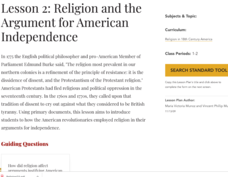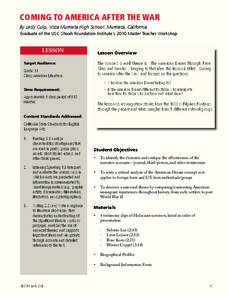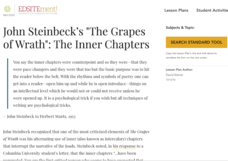EngageNY
Grade 9 ELA Module 3, Unit 1, Lesson 2
Autism isn't an illness or a disability. In the first chapter of Animals in Translation, we learn about Temple Grandin's unique ability to understand animals through her experience with autism. Having read pages four through eight for...
EngageNY
Grade 9 ELA Module 4, Unit 1, Lesson 6
How do writers create a specific tone in their text? As class members continue their study of Sugar Changed the World, they focus on the words and phrases that Aronson and Budhos use to create that tone in their descriptions of arduous...
EngageNY
Grade 9 ELA Module 4, Unit 1, Lesson 7
Class members examine the images Arson and Budhos use to depict the working conditions on the sugar plantations and consider how these images support the arguments the writers present in Sugar Changed the World.
EngageNY
Grade 9 ELA Module 4, Unit 1, Lesson 8
In a close reading of "The Overseer" chapter from Sugar Changed the World, groups focus on the words Aronson and Budhos use to contrast the lifestyles of enslaved people and their enslavers. The whole class then engages in an...
EngageNY
Grade 9 ELA Module 4, Unit 1, Lesson 11
As part of a study of how writers structure their text so that readers understand events, class members do a close reading of "Is It Lawful to Make Slaves of Others Against Their Will?" a chapter in Aronson and Budhos' Sugar Changed the...
EngageNY
Grade 9 ELA Module 4, Unit 1, Lesson 2
The second instructional activity in a unit about how writers develop their central ideas and use evidence to support their arguments focuses on the role that scholars at Jundi Shapur, "The World's First True University," played in the...
College Board
2004 AP® English Language and Composition Free-Response Questions Form B
Are there unspoken rules everyone should follow? Questions from the 2004 AP® English Language and Composition Form B ask scholars to give opinions on how unspoken rules help people belong in society. Pupils also analyze a writer's...
Library of Congress
Thomas Jefferson's Library: Making the Case for a National Library
The United States Library of Congress, the largest library in the world. But such was not always the case. The library was destroyed during the War of 1812. In a persuasive letter to Samuel H. Smith, Thomas Jefferson offered to sell his...
College Board
Reading—Synthesis and Paired Passages
Good readers make connections between texts. The SAT regularly assesses the ability to make those connections using paired reading passages, a topic discussed in an official SAT practice lesson plan on synthesis. During the lesson,...
Benjamin Franklin Tercentenary
Ingenious: Franklin Assembles a Scientific Community
Few Americans have heard of the burgeoning scientific community known as the America Philosophical society, started by none other than Benjamin Franklin. With inquiry, research, and discussion, high schoolers come to understand their...
National Endowment for the Humanities
Lesson 1: The First Great Awakening
High schoolers examine the First Great Awakening and how it affected religious belief in colonial America. They read and analyze primary source documents, explore various websites, and write a five-paragraph essay examining the beliefs...
National Endowment for the Humanities
Lesson 2: Religion and the Argument for American Independence
Young scholars examine how religion affected arguments justifying American independence. They read and analyze primary source documents, and write an essay analyzing how Americans used religious arguments to justify revolution against a...
Curated OER
Basil Heatter, "The Long Night of the Little Boats"
“It was a miracle.” Basil Heatter’s “The Long Night of the Little Boats,” which details the miraculous rescue of the British army from the shores of Dunkirk in 1940, is featured in a series of exercises that ask class members to read,...
University of Southern California
Coming to America After the War
As part of their exploration of the American dream, class members examine primary source materials to compare immigrant experiences of those arriving early in our country's history to those arriving in the US after World War II. To...
Curated OER
The Poetics of Hip Hop
The Bard, Nikki Giovanni, Mos Def? “Sonnet 18,” Ego Tripping,” and “Black on Both Sides”? Sure! It’s the poetics. Class members compare the lyrics, rhythm, and rhyme in classic poetry to hip-hop in a richly detailed resource that...
National Endowment for the Humanities
John Steinbeck’s "The Grapes of Wrath": The Inner Chapters
Here’s a must-have resource for anyone using The Grapes of Wrath. Everything from guiding questions to background information, from photographs to documentary films, from activities to assessments is included in a richly detailed packet...
EngageNY
Grade 9 ELA Module 4, Unit 1, Lesson 4
Class members continue examining how writers develop and support their ideas by comparing two texts about globalization. Alongside chapters from Sugar Changed the World, young scholars read an article by the World Bank entitled...
Odell Education
Making Evidence-Based Claims: Grade 9
Sorry, Charlie. Scholars take a close look at Apology by Plato. Activities analyzing the text help pupils understand, make, organize, and write about claims. Learners work in groups, complete claim tools, and evaluate thinking by filling...
EngageNY
Grade 9 ELA Module 4, Unit 1, Lesson 22
Class members read "Satyagraha," the concluding section of Marc Aronson and Marina Budhos' Sugar Changed the World: A Story of Magic, Spice, Slavery, Freedom, and Science, and analyze how the authors support their claim that terrible...
EngageNY
Grade 9 ELA Module 4, Unit 1, Lesson 21
Class members read the chapter, "Serfs and Sweetness" from Sugar Changed the World, and identify the central idea that the development of beet sugar and modern farming technology changed the reliance on the plantation system and made...
EngageNY
Grade 9 ELA Module 4, Unit 1, Lesson 5
What did the Crusades and plantations do with the global sugar spread? As class members continue their study of Sugar Changed the World, they examine how Crusaders brought sugar to Western Europe and how cultivating sugar led to the...
Channel Islands Film
Dark Water: Lesson Plan 3 - Grades 6-12
After watching the documentary Dark Water about a traditional Chumash ceremony and reading a Chumash origin story, viewers are asked to create a coat of arms and to craft an essay that details a family tradition or their own origin story.
iCivics
Drafting Board: Electoral College
Should the president of the United States be voted by the Electoral College or the popular vote? Your young historians will consider the pros and cons of the Electoral College, and make an argument using reasons and evidence provided in...
Curated OER
“Self Reliance” by Ralph Waldo Emerson
“Nothing is at last sacred but the integrity of your own mind.” Readers not only identify aphorisms in Emerson's "Self Reliance," but also find evidence of transcendental elements contained in the essay. They also demonstrate consistency...
Other popular searches
- Sensory Details in Writing
- Elaborate Details in Writing
- Concrete Details in Writing
- Descriptive Details in Writing
- Using Details in Writing
- Specific Details in Writing
- Literacy Details in Writing
- Details in Writing Pictures
- Vivid Details in Writing
- Supporting Details in Writing

























